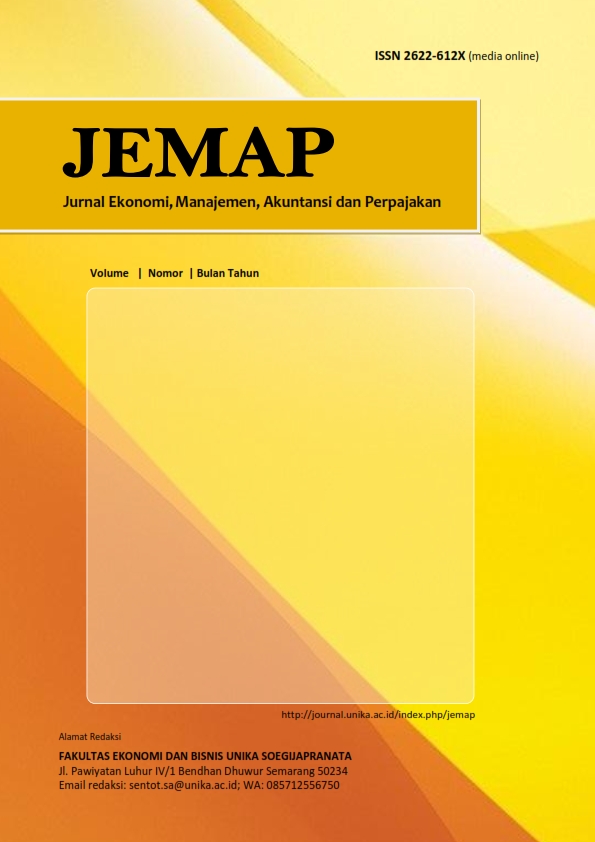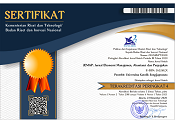Implementasi Green Business dalam Ekoturisme di Jawa Tengah (Studi pada Tiga Obyek Wisata)
Abstract
In the year 2025 it is hoped that ASEAN will become tourist destination offering ASEAN experience which unique, diversify, and developing sustainable, inclusive, and responsible tourism. It will become significant contributionto the economic life of ASEAN community. According to that vision, Indonesia also develops tourism which environment friendly and green business. Ecoturism as traveling activities to destination region should folow natural rules for enjoying natural beauty, including education-comprehension and support to conservation which could increase local community income. In this research selected three tourist ecotourism destination including Morosari Mangrove Forest at Demak Region, Tlogo Tuntang Tourism at Bawen Salatiga, and Forest Park Botanical Garden Mangkunegoro 1 at Lawu Mountain at Karanganyar Region. Research result showed that Mangrove Forest Demak, Tlogo Resort Tuntang and Forest Park Botanical Garden not yet becoming ecotourism and tourist business which profitable and sustainable tourism. There is local management desire to make tourism based on natural wealth or tourist destination which conserving ecology. The three tourist destinations generally need continous improvement so that becoming intereseting ecoturism and profitable. It is needed to continuously conserve flora and fauna, and environment management to attract visitors.
Keywords
Full Text:
PDFReferences
Fandeli, Chafid dan Mukhlison. (2000). Pengusahaan Ekowisata. Yogyakarta: Fakultas Kehutanan Universitas Gadjah Mada.
Dwijayati, Aprilia Kukuh, Djoko Suprapto, dan Siti Rudiyanti. (2016). Identifikasi Potensi dan Strategi Pengembangan Ekowisata pada Kawasan Konservasi Hutan Mangrove Desa Pasar Banggi Kabupaten Rembang. Management of Aquatic Resources. Vol 5. No 4. Halaman 328-336.
Nirwandar, Sapta, . Ecotourism in Indonesia. Presentasi power point. Diambil dari https://www.google.co.id/url?sa=t&rct=j&q=&esrc=s&source=web&cd=1&cad=rja&uact=8&ved=0ahUKEwiF69XQnIHWAhUUTI8KHU-GClcQFgglMAA&url=https%3A%2F%2Fsustainabledevelopment.un.org%2Fcontent%2Fdocuments%2F4488Nirvandar.pdf&usg=AFQjCNFmgDbwDemn4As-ND73uW0qk65EvA.
Perks, E. & Smit, S. (2010). A perceptual study of the impact of green practice implementation on the business functions. Southern African Business Review .Volume 14 Number 3. Nelson Mandela Metropolitan University.
Purnawan, Muhammad Rifan Billal. (2018). Redesain Tlogo Resort (Penekanan Green Architecture). Skripsi. Fakultas Teknik Arsitektur. Universitas Muhammadiyah Surakarta.
Rahmawaty. (2006). Upaya Pelestarian Mangrove berdasarkan Pendekatan Masyarakat. Repository USU. Dept. Kehutanan. Fak Pertanian USU. Medan.
Steck, Birgit (1999). Sustainable Tourism as Development Option. Federal Ministry for Economic Co-operation and Development. Friedrich-Ebert-Allee 40 D-53113 Bonn, Germany.
Suryawan, Adi Margaretha Christita, dan Isdomo Yuliantoro. (2015). Potensi dan strategi pengembangan Taman Hutan Raya Gunung Tumpa Manado, Sulawesi Utara dalam upaya konservasi keanekaragaman hayati subkawasan Wallcea. Prosiding Seminar Nasional Masyarakat Biodiversity Indonesia.
Wall, G. (1996). Ecotourism: Change, Impacts, Opportunities. The Ecotourism Equation: Measuring the Impacts. Bulletin 99, pp. 108-117.
Widiyanto, Hendro, Slamet Minardi dan Sunarto. (2015). Kajian Sensitifitas Kawasan Taman Hutan Raya (Tahura) KGPAA Mangkunagoro I Karanganyar. Jurnal Ecosains. Vo. 7 No.3.
Wood, M. (2002). Ecotourism: Principles, Practices and Policies for Sustainability. SCP Publication of United Nation Environment Program. ISBN: 92-807-2064-3
DOI: https://doi.org/10.24167/jemap.v3i1.2604
Refbacks
- There are currently no refbacks.
e-ISSN 2622-612X | View My Stats







